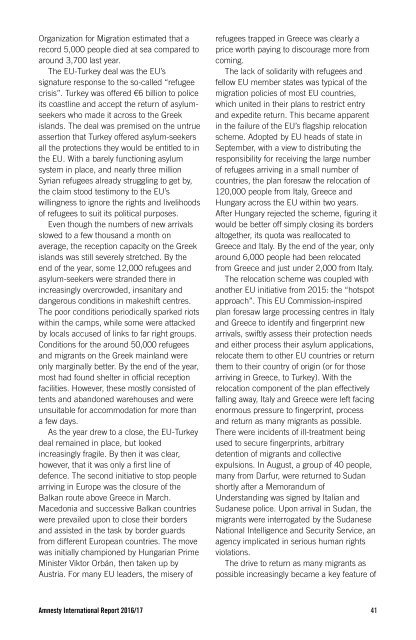AMNESTY INTERNATIONAL REPORT 2016/17
2lEHU9j
2lEHU9j
Create successful ePaper yourself
Turn your PDF publications into a flip-book with our unique Google optimized e-Paper software.
Organization for Migration estimated that a<br />
record 5,000 people died at sea compared to<br />
around 3,700 last year.<br />
The EU-Turkey deal was the EU’s<br />
signature response to the so-called “refugee<br />
crisis”. Turkey was offered €6 billion to police<br />
its coastline and accept the return of asylumseekers<br />
who made it across to the Greek<br />
islands. The deal was premised on the untrue<br />
assertion that Turkey offered asylum-seekers<br />
all the protections they would be entitled to in<br />
the EU. With a barely functioning asylum<br />
system in place, and nearly three million<br />
Syrian refugees already struggling to get by,<br />
the claim stood testimony to the EU’s<br />
willingness to ignore the rights and livelihoods<br />
of refugees to suit its political purposes.<br />
Even though the numbers of new arrivals<br />
slowed to a few thousand a month on<br />
average, the reception capacity on the Greek<br />
islands was still severely stretched. By the<br />
end of the year, some 12,000 refugees and<br />
asylum-seekers were stranded there in<br />
increasingly overcrowded, insanitary and<br />
dangerous conditions in makeshift centres.<br />
The poor conditions periodically sparked riots<br />
within the camps, while some were attacked<br />
by locals accused of links to far right groups.<br />
Conditions for the around 50,000 refugees<br />
and migrants on the Greek mainland were<br />
only marginally better. By the end of the year,<br />
most had found shelter in official reception<br />
facilities. However, these mostly consisted of<br />
tents and abandoned warehouses and were<br />
unsuitable for accommodation for more than<br />
a few days.<br />
As the year drew to a close, the EU-Turkey<br />
deal remained in place, but looked<br />
increasingly fragile. By then it was clear,<br />
however, that it was only a first line of<br />
defence. The second initiative to stop people<br />
arriving in Europe was the closure of the<br />
Balkan route above Greece in March.<br />
Macedonia and successive Balkan countries<br />
were prevailed upon to close their borders<br />
and assisted in the task by border guards<br />
from different European countries. The move<br />
was initially championed by Hungarian Prime<br />
Minister Viktor Orbán, then taken up by<br />
Austria. For many EU leaders, the misery of<br />
refugees trapped in Greece was clearly a<br />
price worth paying to discourage more from<br />
coming.<br />
The lack of solidarity with refugees and<br />
fellow EU member states was typical of the<br />
migration policies of most EU countries,<br />
which united in their plans to restrict entry<br />
and expedite return. This became apparent<br />
in the failure of the EU’s flagship relocation<br />
scheme. Adopted by EU heads of state in<br />
September, with a view to distributing the<br />
responsibility for receiving the large number<br />
of refugees arriving in a small number of<br />
countries, the plan foresaw the relocation of<br />
120,000 people from Italy, Greece and<br />
Hungary across the EU within two years.<br />
After Hungary rejected the scheme, figuring it<br />
would be better off simply closing its borders<br />
altogether, its quota was reallocated to<br />
Greece and Italy. By the end of the year, only<br />
around 6,000 people had been relocated<br />
from Greece and just under 2,000 from Italy.<br />
The relocation scheme was coupled with<br />
another EU initiative from 2015: the “hotspot<br />
approach”. This EU Commission-inspired<br />
plan foresaw large processing centres in Italy<br />
and Greece to identify and fingerprint new<br />
arrivals, swiftly assess their protection needs<br />
and either process their asylum applications,<br />
relocate them to other EU countries or return<br />
them to their country of origin (or for those<br />
arriving in Greece, to Turkey). With the<br />
relocation component of the plan effectively<br />
falling away, Italy and Greece were left facing<br />
enormous pressure to fingerprint, process<br />
and return as many migrants as possible.<br />
There were incidents of ill-treatment being<br />
used to secure fingerprints, arbitrary<br />
detention of migrants and collective<br />
expulsions. In August, a group of 40 people,<br />
many from Darfur, were returned to Sudan<br />
shortly after a Memorandum of<br />
Understanding was signed by Italian and<br />
Sudanese police. Upon arrival in Sudan, the<br />
migrants were interrogated by the Sudanese<br />
National Intelligence and Security Service, an<br />
agency implicated in serious human rights<br />
violations.<br />
The drive to return as many migrants as<br />
possible increasingly became a key feature of<br />
Amnesty International Report <strong>2016</strong>/<strong>17</strong> 41


